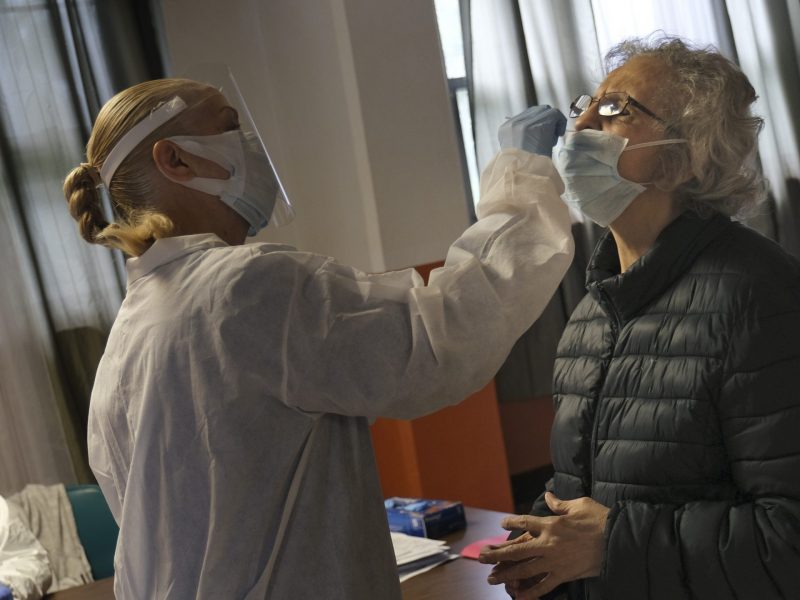By Wallace McKelvey/PennLive
Pennsylvania’s hospitals will still be required to send key coronavirus data to the state amid the Trump administration’s move to strip the Centers for Disease Control and Prevention of its role in coronavirus data collection.
Information about COVID-19 hospitalizations, bed capacity, protective equipment and ventilators disappeared from the CDC website only to return this week with a disclaimer that the figures no longer included data being funneled to a contractor of the U.S. Department of Health and Human Services.
Trump officials said the change was designed to speed up reporting under a single reporting system but critics raised concerns about privacy, transparency and the $10 million no-bid federal contract awarded to TeleTracking, a Pittsburgh-based health data firm.
Nate Wardle, a spokesman for the state Department of Health, said Thursday that the federal reporting shakeup does not exempt hospitals from reporting the information to the state.
“Hospitals will need to continue to report data to the department, as they have been [doing] for several months now,” he said, in a written statement. “We hope that any further reporting requirements asked of them by the federal government does not detract from their ability to provide health care services to those in need, or require further changes and modifications.”
Thus, hospitalization data at the state level should remain unchanged — for now — although he noted that public health officials may face difficulty when seeking reliable information from other states.
“Our public-facing data will not change and . . . we do not expect it to affect our work,” Wardle said. “However, it may affect our ability to look at data from other states, and nationally, but there are other groups that are tracking this data as well.”
One example: Johns Hopkins University, who launched one of the first and most popular coronavirus tracking dashboards, sources its data directly from the states — not the CDC nor HHS.
“What worries me,” Johns Hopkins epidemiologist Jennifer Nuzzo told CNBC, “is that we seem to be pushing rather suddenly in the midst of what feels like a very urgent time in terms of surging cases that we’re seeing across the country. The question is, what are we going to lose in this transition, and in particular at a moment where we really don’t want to lose any ability to understand what’s happening in hospitals.”
The changes in federal reporting came amid a resurgence of cases nationwide, hospitals being stretched to the limit in places like Texas and increasing tension between President Donald Trump and his public health advisors, including a public spat with infectious disease expert Anthony Fauci and Trump’s criticism of the CDC’s school reopening guidelines.
Trump administration officials said the changes were not punitive. Instead, they were designed to create a single repository for hospitalization data.
“We needed to collect this data as fast as possible,” HHS spokesman Jose Arrieta said, in a written statement. “That’s why we created [this project], a secure set of capabilities powered by eight commercial technologies for sharing, parsing, housing, and accessing COVID-19 data.”
But a number of public health experts remain skeptical of this plan to turn oversight to a private company overseen by a federal agency run by a political appointee. The move marks a significant change: the CDC has overseen public health data collection for decades
“Placing medical data collection outside of the leadership of public health experts could severely weaken the quality and availability of data, add an additional burden to already overwhelmed hospitals and add a new challenge to the U.S. pandemic response,” said Thomas File, president of the Infectious Diseases Society of America, in a written statement.
Coronavirus data, he said, must be collected and reported in “a transparent and trustworthy manner and must not be politicized.”
U.S. Sen. Patty Murray, a Democrat from Washington state, raised concerns about the no-bid contract with TeleTracking. The existing system, she wrote in a letter to officials at the CDC and HHS, already had capacity to expand to growing needs without the added time and expense of switching over to a brand new system.
“The new system seems to create a second mechanism through which hospitals could report the same information already collected through [that system],” she wrote.
In Pennsylvania, at least, hospitals will still be expected to use the existing reporting system, raising the possibility of duplicated efforts. It’s also unclear where the data sent to the new system will end up. So far, at least, HHS has not launched a coronavirus data dashboard of its own.
Spokeswoman Rachel Moore said the Hospital and Healthsystem Association of Pennsylvania “look[s] forward” to working with the state and federal officials but did not comment on how the changes impacted actual hospital systems.
Amid a surge of new COVID-19 infections, Gov. Tom Wolf this week imposed new restrictions on restaurants, bars and indoor gatherings. He also said he’s willing to “pull the plug” on school reopenings.
PennLive?and The Patriot-News are partners with PA Post.
PA Post is an independent, nonpartisan newsroom covering politics and policy in Pennsylvania. For more, go to PaPost.org.
